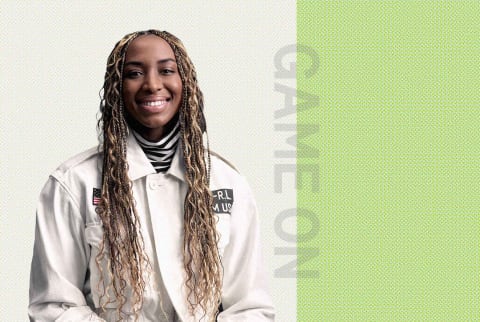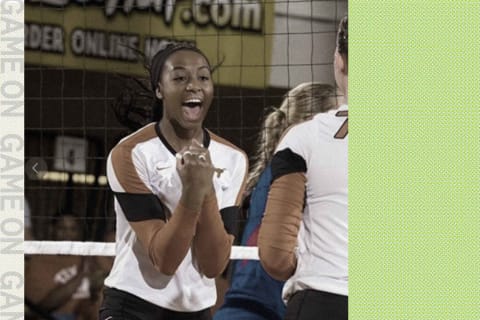Advertisement
Team USA Volleyball & Silver Medalist Chiaka Ogbogu's Best Wellness Tips


Playing on Team USA Volleyball during the 2024 Paris Olympics, the 6’2” middle blocker Chiaka Ogbogu just took home the silver with Team USA. She was also on the 2020 team that won a gold medal in the 2020 Summer Olympics in Tokyo.
Hailing from Texas—where she led her high school team to two straight state championships and played collegiate volleyball at the University of Texas Austin—she now plays internationally, most recently in Turkey. And of course, she plays for Team USA.
“I think for young girls to see [women’s sports coverage in the media] is really important, because I didn't see that growing up,” she told me recently. “And it's cool that I got to this point, but I'm like, What would my journey have looked like if I got to watch women’s volleyball as a kid? Just the idea of little girls getting to watch these games is really special for a lot of us and future generations.”
Below, our conversation about how she cares for herself when she’s not playing, how she approaches nutrition, and what she’s going to try during her upcoming off season.
mindbodygreen: What does it mean to be a strong woman?
Chiaka Ogbogu: It’s about recognizing your strengths and weaknesses—and then standing firm and loving yourself through that regardless. The moments when I’ve found the most strength in myself is when I’ve been able to acknowledge the days where I don’t feel my best, but then still figuring out ways to support and love myself through those days.
mbg: I want to talk about how you keep up your strength physically—let’s start with nutrition. What meals help you feel strongest?
Ogbogu: I’ve had such an interesting relationship with nutrition—learning about the food that offers the best support for what I’m doing on the court versus what I think I need to be eating in a day versus what sounds the best.
But for me, I feel like I’ve gotten accustomed to finding color when it comes to my food. I like to make sure I have a lot of color on my plate, and making sure that it’s visually appealing to eat. I’ve worked with so many dietitians and nutritionists throughout my career—I’ve learned that just the presence of color not only fuels your body, but it’s good for your mind too. And I know I play my best when my mind is also in the right place.
The way I’d describe my eating is Mediterranean style. It’s a lot of salad or grain bowls with Brussels sprouts, pickled onions, grains, and things like that. Anything you would Mediterranean dish.
mbg: Well, they say the Mediterranean diet is one of the healthiest to follow…
Ogbogu: I play professionally in Turkey and just fell in love with the way they eat. So I try to carry it on over here.
mbg: what is your recovery routine?
Ogbogu: It depends where we are in the season and how my body's feeling. As I’m getting older, too, my body is telling me I need to be really good at recovery.
I don’t have a specific routine, but I have things I rely on. I try to be good with sleep. Post game and post practice, I'll use Normatec recovery boots.
Then supplements have been a really big game-changer for me, especially on the road. I take sleep aids and things that help your body recover—like magnesium, calcium, things like that.
I'm always open to new recovery ideas. It’s been cool to see what other athletes do in other sports, and see if I can take a bit from them.
mbg: what’s the craziest thing you’ve done in the hopes of optimizing your performance?
Ogbogu: I don't know if anything I've done has been super crazy. I've seen athletes who do oxygen chambers or like sleep chambers.
I've done cryotherapy. For me, that was extreme because I hate being cold.
When I move into this off season, one of my goals is just to try all those crazy techniques I see other athletes do to see if it makes a difference.
mbg: What are your favorite workouts that have nothing to do with your sport?
Ogbogu: I’ve started doing pilates with my other teammates and I’ve seen the benefits—especially with how well we’ve been able to recover going back into volleyball.
But coming up, this will be the first time I’m having an off season during the fall. So I’m excited to also get into the pickleball craze. It looks fun and easy to pick up! I think this fall is really going to be about being open to other styles of training now that I have more time to do so.
mbg: How do you mentally get prepared for a big match?
Ogbogu: I think now it's different from when I was in college. It's so funny because I feel like in college I needed to get really hyped. I was on all the coffees and all the energy drinks. It was all about getting to like my highest state of concentration, which later down the road, it's not sustainable.
Then with each level comes new pressures. So there's obviously more anxieties present when you’re playing at the highest level. So now it’s more about getting to my most calm state, which has been interesting.
I think part of this journey is just about maturing. It’s about understanding that you probably think your most rationally when you’re at your calmest state, versus when you’re younger and it’s about benign spirited. Technique and IQ are not as much of a factor then, it’s just about physically.
Compared to now, when everyone is physical. Everyone has been playing the game at a high level for a long time. So then it’s all about what team has the IQ to win.
To calm myself, I’ve been messing with a few different techniques, from meditation to sound frequency. I read Kobe Bryant's book, The Mamba Mentality: How I Play, and it talks about sound frequency. So I decided to look into it and try it. I found that calming frequencies1 are supposed to level your nervous system. So now I’ve been doing that—plus experimenting with other techniques.
mbg: Resilience is such an interesting topic, and one I talk a lot about with other athletes. I’ve found that some of that resilience is innate—maybe you’re just born with it—but the other part is trained. How do you build resiliency in yourself?
Ogbogu: I'm sure there's something innate in high performing athletes in which we have this addiction to pursuing mastery. So that's part of it. But I think a lot of us—and I know specifically with the national team and then myself on an individual level—work with sports psychologists to help us develop tools to move through sticky citations, such as losses or high-stress games.
They help us acknowledge feelings, compartmentalize things when we need to, and then move on from them. It’s important to not dwell on what has happened, be that good or bad. How do we develop tools to be able to acknowledge things, compartmentalize things, move through
For me, I'm a big journaler. I like to dump it all out after a bad match. Getting it on paper gets it out of my mind. It allows me to physically turn the page on something, so I can mentally focus on the next thing.
But the beauty of our sport is that a lot of our games are in tournaments, so you don’t have a lot of time to think about what just happened because you’re probably going to be playing again the next day. Thankfully I’m not in a sport in which you have one event every few weeks or months—then you just have so much time to think about it. Our sport moves so quickly, there’s not much time to dwell on bad games.

mbg: what does it mean to be a good teammate?
Ogbogu: I'm thankful that I had that teammate experience growing up as a kid because it taught me how to work well with others, especially when you come from different backgrounds.
I think being a good teammate is first acknowledging that not everyone grew up the same way as you or has the same way of thinking as you.I think just on a basic level, understanding that helps you have empathy.
And then the other important factor is empathy. I know my favorite teammates just had the most empathy and respect for everyone around them. It didn’t matter if they disagreed with someone, they always knew that that person was still important enough to contribute something to the team.
That’s been the way I try to show up for the team, leading with empathy. It gets you really far with your teammates, and it also makes for a more exciting and conducive environment. It makes people want to show up and be around you if they know they can trust you and be safe with you.
mbg: what advice would you give young girls in volleyball?
Ogbogu: Honestly, my advice would be to try as many sports as you can or be part of as many groups as you can.
I think that was helpful for me growing up because I learned a lot. I played basketball. I did Taekwondo. I took something from each sport because I think each sport attracts different types of people and has different challenges.
Then try and stick with it for at least a year just to see what you can gain from it. Because as kids it's really easy to be like, I didn't like this today. I'm just gonna jump to the next thing. But I’m really grateful to my parents for not letting me quit things too early. I think there’s also lessons in that, too. It’s about working through things until you can officially decide, OK I’m really not interested in this.
mbg: We’re in this really cool moment in time in which women’s sports is getting so much more attention than it has in the past. What has that been like to experience first hand?
Ogbogu: I think for us athletes, a lot of us are kind of Finally! Where has everyone been? It’s exciting to see volleyball now emerging in the States, like it's exciting for us because we haven't had a professional league yet. But now it’s starting up next year. And just all the hype and media around women’s basketball has been inspiring.
I think for young girls to see it is really important, because I didn't see that growing up. And it's cool that I got to this point, but I'm like, What would my journey have looked like if I got to watch women’s volleyball as a kid? Just the idea of little girls getting to watch these games is really special for a lot of us and future generations.